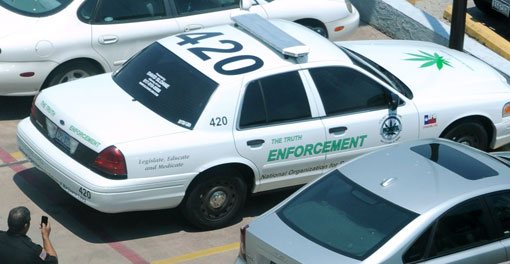Adopting what might be called the Qaddafi defense, the head of Bahrain’s military claimed that the country’s brutal crackdown on dissent was entirely justified because the kingdom’s security forces had been confronted by young protesters under the influence of mind-altering drugs.
- DrugWarRant.com, the longest running single-issue blog devoted to drug policy
Join us on Pete's couch.
 Send comments, tips,
Send comments, tips,
and suggestions to: Recent Comments
Servetus on Marijuana prohibition and the origins of totalitarianism: “Psilocybin research reveals different social behavior effects as well as inflammation in female mice from exercise in a study of…” Feb 4, 18:56
Servetus on Marijuana prohibition and the origins of totalitarianism: “Research at the University of Texas at San Antonio reveals Δ⁹-THC in combination with Celecoxib reduces Alzheimer’s-related brain pathology in…” Jan 31, 10:50
Servetus on It isn’t about the drugs.: “Pete Hegseth is being blamed for committing three war crimes, including perfidy in the bombing of boats off the coast…” Jan 14, 20:38
Servetus on Marijuana prohibition and the origins of totalitarianism: “CBD treats fetal alcohol disorder in laboratory studies on mice: 14-Jan-2026 – Cannabidiol (CBD) could become a therapeutic tool to…” Jan 14, 20:25
Servetus on Marijuana prohibition and the origins of totalitarianism: “Gene therapy alternative for chronic pain might replace use of opioids: 7-Jan-2026 –Philadelphia—A preclinical study uncovered a new gene therapy…” Jan 11, 10:57
Servetus on Marijuana prohibition and the origins of totalitarianism: “Yoga as an adjunct to chemotherapy can treat opioid withdrawal: 7-Jan-2026 – In this randomized clinical trial, yoga significantly accelerated…” Jan 11, 10:27
Servetus on Marijuana prohibition and the origins of totalitarianism: “Modifications of chemical scaffolds associated with psychedelic compounds can be achieved using ultraviolet light: 7-Jan-2026 — UC Davis researchers have…” Jan 11, 09:46
Paul Revere on It isn’t about the drugs.: “Sure, it’s regime change—now let’s take Iran, Cuba, Colombia, Mexico. All sterling examples of a self-determination for indigenous people. Also,…” Jan 4, 06:14
Pages
- About
- Articles
- A Day at the Museum
- A story for Thanksgiving (Isidro and Teresa Aviles)
- Andrea Barthwell, caught red-handed
- Andrea Barthwell, Snake Oil Salesman
- Bong Hits 4 Jesus – Supreme Court Case
- DEA Bad Girl Michele Leonhart
- Deep Thoughts About the Drug War
- Drug War Victims
- Drug War Videos
- Drug WarRant Joins SOPA, PIPA Protest
- Hammer Down, Pop Up
- If I were Contrarian-King of the United States
- Increase in Burger Abuse Seen
- Irvin Rosenfeld and the Compassionate IND — Medical Marijuana Proof and Government Lies
- Karen Tandy and the DEA (Can Congress Get a Clue?)
- Len Bias – the death that ushered in two decades of destruction
- Mother and Son
- Patriot Act, Victory Act, Despot Act
- Petition for Correction under the ONDCP Information Quality Guidelines
- Raich v. Ashcroft
- Rand and American Enterprise Institute Studies – Indictments of Federal Drug Policy
- the Drug Czar is Required by Law to Lie
- Treatment Statistics
- Who’s Who in Drug Prohibition
- Why is Marijuana Illegal?
February 2026 M T W T F S S 1 2 3 4 5 6 7 8 9 10 11 12 13 14 15 16 17 18 19 20 21 22 23 24 25 26 27 28 Archives
Authors
February 2026 M T W T F S S 1 2 3 4 5 6 7 8 9 10 11 12 13 14 15 16 17 18 19 20 21 22 23 24 25 26 27 28

